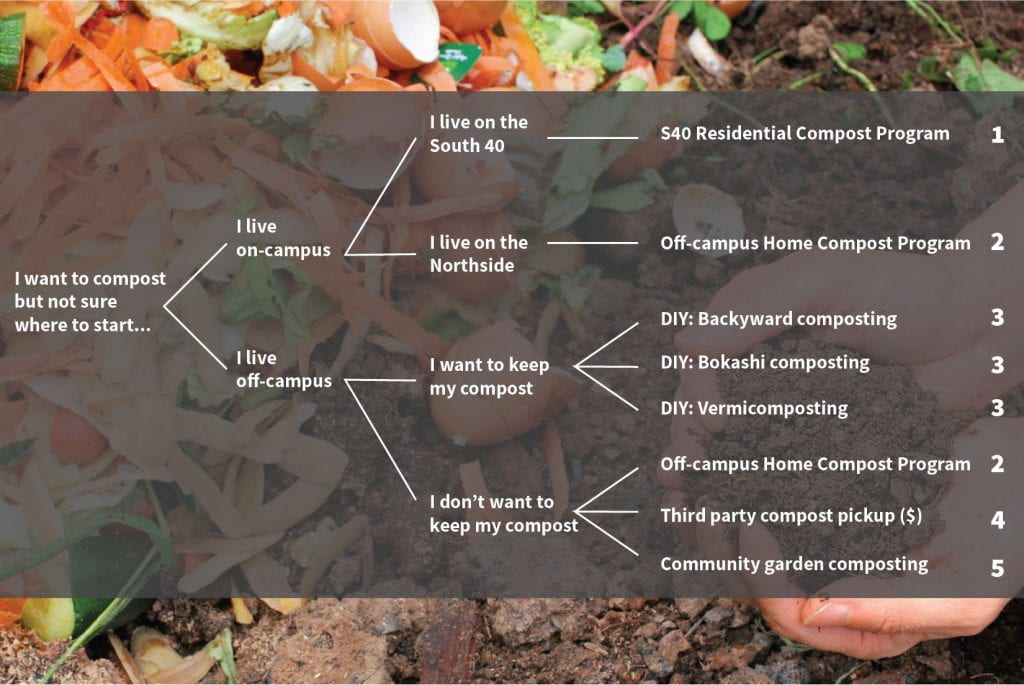Whatever your living situation is, if you want to compost, you will find a way! This page is designed to compile composting programs, options, and resources for everyone in the WashU community. While this is not an exhaustive list, it should help you decide which composting option is best fitted for you and where to look for more information.
Decision Tree
Review the graph below to identify the composting options that are most appropriate based on your situation and scroll down for more info about each of these options.

1. South 40 Residential Compost Program
The Residential Composting program allows all residents of the South 40 to collect compost in their residence. Upon signing up, participants receive a 5-gallon compost bucket for their dorm or suite for the remainder of the school year. After filling the bucket up with food, paper to-go boxes, and other compostable waste, participants can empty their bucket in the large compost bin located in the floor trash room.
For who? Anyone living on the South 40.
2. Off-Campus Home Compost PILOT Program
The pilot period has passed – this service is not currently available.
3. Do-It-Yourself Composting
Composting does much more than diverting waste from landfills: it creates rich and nutritious soil, a critical step to return nitrogen and other essential nutrients to the Earth. For those who want to keep the fruit of their labor, do-it-yourself composting is an easy and rewarding process. You’ll then be able to use your compost mix for your yard, your houseplants, or just to sprinkle on your neighborhood’s flower beds! Don’t be intimidated with thoughts of mountains of compost you will have to manage. It is astounding how much food and yard waste reduce in volume through the compost process. For example, a three person household collecting food scraps regularly may only result in a couple 5 gallon buckets of finished compost after 1 year.
There are multiple methods for DIY composting at home, with the most popular being an outdoor compost pile (see resources below). Bokashi composting (compost by fermentation) and Vermicomposting (compost by worms) are well-suited for those with limited (or no) yard space. They are also portable! These options require some additional supplies but are well worth looking into.
For who? Everyone who is ready for it!
4. Third-Party Compost Pick Up
BLH Farms, a local Known & Grown certified farm, offers a residential composting service to those living in the St. Louis area. They will provide you with a clean bucket to discard food waste in, and collect it from your porch. You can even request to receive the finished compost if you need it! The charge is $6 per pickup for 3.5 gallon bucket and $8 per pickup for 6.5 gallon bucket.
New Earth Farm, also a local Known & Grown certified farm, just launched a similar program – Compost STL – in the St. Louis Metro area. Weekly rates are $26/month or $22/month if you sign up for a whole year.
If you don’t live in the St. Louis area, search for local orgs who may be able to provide a similar service.
For who? Anyone who can afford it.
5. Partner with a Community Garden
If you don’t want to deal with the composting process but the Danforth campus is not a convenient drop-off point for you, we invite you to identify and connect with nearby community gardens who may benefit from your food scraps.
There are many community gardens in the St. Louis area who accept compost from members of the community, most of them are part of the Gateway Greening network. Once you have identified a garden near you on this interactive map, contact volunteer@gatewaygreening.org to be connected with the garden leader.
For who? Everyone.
Why Compost?
Still need to be convinced (or convince your household) that it is important to compost? Learn more about why composting is a critical initiative for communities, institutions like WashU, and households like yours!